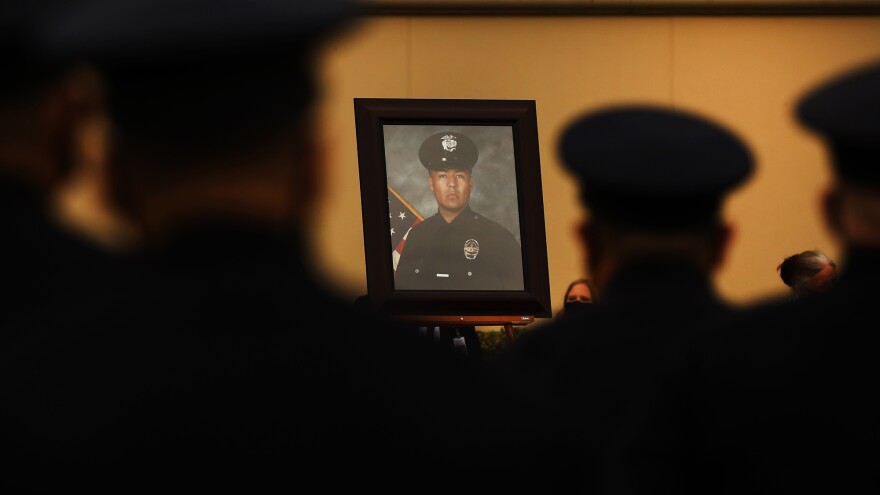In Los Angeles, COVID-19 cases continue to soar at an astonishing rate. In the first seven days of the year, for instance, roughly seven people died each hour.
Ambulances are lining up in front of hospitals, waiting to unload patients into overcrowded intensive care units. Mobile morgues have rolled in as the death count rises. And many experts say the worst is still yet to come.
The coronavirus is taking a heavy toll on the some 13,000 employees of the Los Angeles Police Department. To date, five officers have died due to complications related to COVID-19, and six are currently hospitalized, one in grave condition, according to police Chief Michel Moore. More than 2,000Los Angeles police personnel have tested positive as of earlier this week.
Like elsewhere in the country, the rollout of the COVID-19 vaccine is already underway in Los Angeles. In an interview with NPR's All Things Considered, Moore says he is hopeful that police officers will start receiving them in the next 10 to 14 days.
But also reflecting national trends, an informal survey by the Los Angeles police earlier this month found that 60% of the 9,500 respondents plan to get the vaccine when it is made available to them, while slightly more than 20% said they would not. Another 13% said they needed more information.
"Their concern was for their safety, for — what we see across the country — the confidence that the vaccine is worth taking versus the risk of getting COVID-19 itself," Moore says.
Now, the department is working to increase confidence in the vaccine.
In excerpts from his interview, Moore discusses the reasons behind the vaccine hesitancy and what the department plans to do:
What is your honest assessment at this moment in time of how much of your department is unwilling or reluctant to get vaccinated?
I sat on a panel with Dr. [Anthony] Fauci, and I think he said it best. What is happening in law enforcement is happening all across the country, and that is, the majority of Americans see this vaccine as a critical juncture, the next step for our recovery and for their health and safety. But there is a segment that is worried about the safety of it, the efficiency of it and whether it's worth the risks. And we have a task before us here in Los Angeles and LA city and LAPD, is to provide education. And I think that as more education is provided, we'll see more of our people stepping into it. And I believe at the end, 8 out of 10 or more will take the vaccine.
Why not just make getting vaccinated mandatory?
Currently, the emergency authorization of the two vaccines does not allow, from an occupational health and safety provision, to mandate its provision. You see the same in the health care industry. When you have an emergency authorization, it's my understanding the law does not allow employers to mandate it. Now, once [the vaccine] becomes, if you will, formalized and not just an emergency allowance, I think that will be the next decision point for us in the health care industry, first responders, police, fire and other essential workers. ... So, we're taking this a step at a time. So our key right now is to provide critical information.
But if there are people in your department who don't trust the current guidance, the current science, what makes you think that they would trust your information campaign?
Because the men and women of the department are good listeners, they're good thinkers, they're critical thinkers; they rely on good, solid information. And so our task is to provide it. And the vast majority of people in law enforcement and our first responders want to protect themselves, and they want to protect their families. ... This [pandemic] has our people scared, and yet they still come to work each day, and they're still engaging in efforts to provide for safety and security of the city and they act responsibly.
Copyright 2021 NPR. To see more, visit https://www.npr.org.





